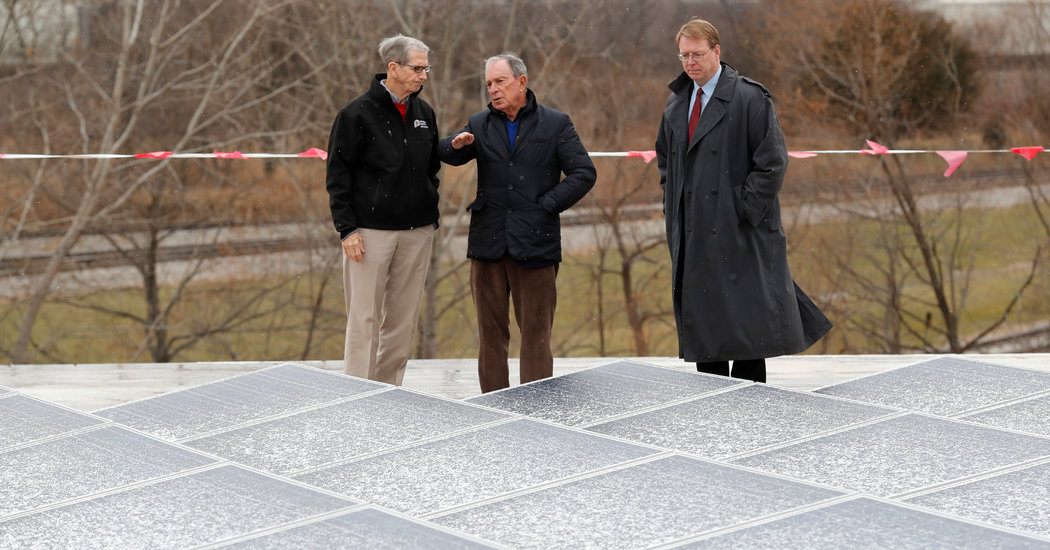
CEDAR RAPIDS, Iowa — On a wintry day, Michael R. Bloomberg stood in black tassel loafers in melting snow while he inspected solar panels on a rooftop, then said he would make climate change “the issue” of the 2020 presidential race.
Mr. Bloomberg, the former New York City mayor who is mulling a run for president, was blunt about his determination to combat the impact of human activity on the environment, and he made clear once again his willingness to take on the coal industry.
“I’ve been very active in closing coal-fired power plants,” Mr. Bloomberg boasted when asked whether a candidate whose top concern is climate change could appeal to voters in the regions like eastern Ohio who helped put President Trump in the White House.
While praising Iowa’s corn-based ethanol as an intermediary fuel needed in the short run, Mr. Bloomberg said it was well past time to cut coal entirely from the energy picture.
“One thing that shouldn’t be part of the mix at all now is coal,” he said.
It was reminiscent of a comment that came to haunt Hillary Clinton in 2016, when she said her policies would put many coal miners out of work — a stance diametrically opposed to that ofMr. Trump, who made reinvigorating the coal industry a centerpiece of his economic message.
While touring a company that installs solar panels in Cedar Rapids, Mr. Bloomberg, 76, attacked President Trump’s rejection of his administration’s own report about the dire economic costs from climate change.
“If you don’t believe in science, I don’t know what to tell you,” he said. “I guess when you need a doctor, you go to a witch doctor or something.”
Mr. Bloomberg was making his first foray of the 2020 campaign to Iowa on Tuesday, though he was by no means the earliest bird to the state with the first nominating contest. With the state’s caucuses still 14 months away, the website Iowa Starting Line has tracked more than two dozen potential Democratic contenders who have already visited.
A billionaire philanthropist, Mr. Bloomberg arrived for four appearances in Iowaafter playing a major financial role in his party’s broad midterm successes. The largess included a $250,000 donation to the Iowa Democratic Party for its statewide campaigns, said Matt Paul, an Iowa operative who helped arrange Mr. Bloomberg’s visit.
Some of Mr. Bloomberg’s policies as mayor of New York, such as support for stop-and-frisk policing and opposition to Wall Street regulations, are at cross-purposes with progressives in his party, who have a large influence in Iowa.
But Mr. Paul, who directed Mrs. Clinton’s Iowa campaign in 2016, played downthose conflicts. He said Iowa Democrats were looking for the candidate who could best make Mr. Trump a one-term president.
“What matters most to them is winning,” he said. “I think ’16 may have been a race about the résumé; ’20 is going to be about victory.”
Once a competitive battleground in presidential elections, Iowa was won decisively by Mr. Trump in 2016, sending Democrats into a deep funk. The 2018 midterms brought them partial redemption. Democrats flipped two congressional seats, although their nominee for governor lost to the incumbent Republican, Kim Reynolds.
The 2018 election underscored Democrats’ weakness outside of major cities and university towns.
Pete D’Alessandro, a top Iowa adviser to Senator Bernie Sanders in the 2016 caucuses, said Mr. Bloomberg would not have any problem appealing to progressives. His challenge, like that of all Democratic contenders, would come in second-tier cities like Davenport and Marshalltown, blue-collar strongholds that fell fully under Mr. Trump’s sway in 2016.
“Mike Bloomberg would do very well in Des Moines,” Mr. D’Alessandro said. “So would Bernie Sanders or Joe Biden or whoever. But how does Mike Bloomberg do in the small cities?
“Is he willing to not get into a limo, but get in a Jeep and drive to Marshalltown? That’s a lot of work.”
Mr. Bloomberg had a jam-packed schedule on his one-day visit. He toured an electrical contractor that installs solar panels, and met with students at a community college studying wind technology. In the evening he met in Des Moines with Moms Demand Action, the gun-control group he supports financially, and appeared at a preview of a climate change movie he bankrolled, “Paris to Pittsburgh.”
Before he spoke at the screening, Mr. Bloomberg was interrupted by a dozen or so protesters from the Democratic Socialists of America, who accused him of being “Donald Trump lite” and insufficiently green because he supports fracking as a transitional option on the road to clean energy.
As the protesters were led out by the police, Mr. Bloomberg joked that it was like being back in New York, and said he would meet with them. “People want recognition and respect,” he said. “I’m happy to give them that.”
The field of potential 2020 Democrats highlighting climate change as a central issue is crowded.
On Monday, Mr. Sanders led a town hall event on the topic that was broadcast on social media from Washington, in which he called global warming “the great crisis facing our planet and facing humanity.”
It is an issue that especially concerns young people, who flexed their muscles in the midterms, turning out in higher numbers than in any off-year election in the past quarter-century, according to one estimate.
On the second issue he is most passionate about, gun safety, Mr. Bloomberg took a stance that might make it hard for many moderate Iowans to follow him.
“I think if you have children at home maybe you shouldn’t have a gun,” he said. “That’s just too dangerous.”
